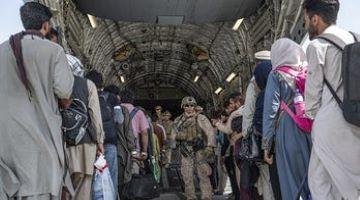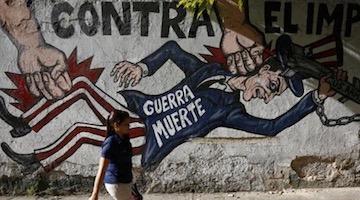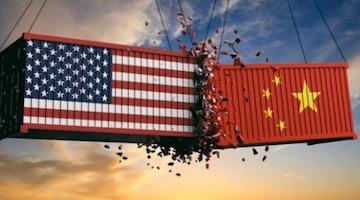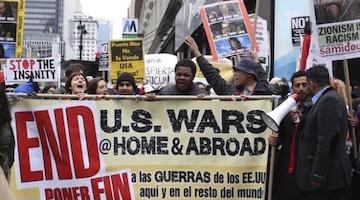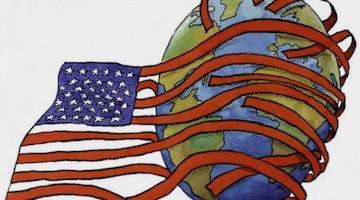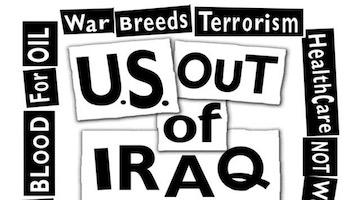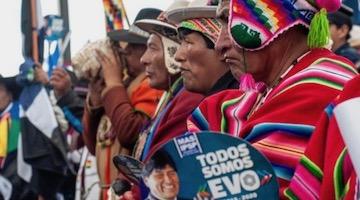Will a new wave of activism finally produce a real mass movement against “boundless” militarism?
“An uncompromising antiwar campaign will indict the warmakers and their corporate cronies.”
Is a genuine antiwar movement reemerging in the U.S., the citadel of military worship? Will we witness the revival of an anti-imperialist bloc, a cohort of Americans who take a principled stand against U.S. empire and its proliferating wars of choice?
America is the world’s most bellicose nation, as the rest of the planet intimately knows. U.S.-led wars have bloodied a post-Cold War era that might have inaugurated a new age of peace and cooperation.
Yet the myth of American exceptionalism—the belief that our society is an archetype of liberty and a divine gift to humankind—warps our self-perception and hinders rational criticism of our government’s international exploits.
Insularity prevents many Americans from even considering global realities. When they do ponder their nation’s role in the world, Americans tend to see the U.S. as a benevolent force whose main agendas are defending “freedom” and thwarting terrorists and tyrants.
“American exceptionalism warps our self-perception and hinders rational criticism of our government.”
That fantasy coexists with a culture of almost boundless militarism. From martial pregame ceremonies at the ballpark to the rote homages to “our troops” that echo from many airport loudspeakers, celebrating soldiering as a symbol of national virtue is an American institution.
After 9-11, the resurrection of a grand American mission muffled most internal critiques of U.S. intervention. Today, however, a new wave of activism is challenging military adventurism and revitalizing the domestic quest for peace.
Last month, in the wake of the Pentagon’s killing of Iranian general Qassem Soleimani, thousands of people in dozens of U.S. cities participated in antiwar rallies coordinated by Code Pink, United for Peace & Justice, Popular Resistance and other organizations. Now members of these and other national and local groups are attempting to shift from mobilizing to building a committed, grassroots base. From younger leftists to aging veterans of peace campaigns, they are embracing the painstaking work of reconstructing an antiwar front.
“A new wave of activism is challenging military adventurism and revitalizing the domestic quest for peace.”
This is a promising time for such efforts. While outrage at the obscenity and recklessness of the Soleimani strike helped spark last month’s rallies, the protests also reflected widespread revulsion from the prospect of another grueling war in the Middle East. The disastrous invasion of Iraq and the endless fiasco in Afghanistan have exhausted many Americans and deepened their wariness of foreign escapades.
Beyond that collective fatigue lies the growing recognition that U.S. aggression abroad will always reap chaos; that bombs foster fanaticism, at home and abroad; and that conscientious Americans must wage open-ended campaigns against the relentless warmongering of the Washington establishment.
But what does it mean to resist imperialism in the empire of empires? How does one defy the warmakers in a land steeped in conquest—both of internal groups and of foreign populations seen as recalcitrant and hostile to the rule of western capitalism?
Americans are notorious amnesiacs. We have forgotten who we bombed last week. How can we possibly recall our past incursions in the Middle East?
“How does one defy the warmakers in a land steeped in conquest?”
The U.S. has a long record of sabotaging Iran and violating its sovereignty. In 1953, when the CIA orchestrated a coup to overthrow Mosaddegh, Iran’s duly elected leader, it ousted a champion of secular democracy who had introduced a host of social reforms and nationalized oil interests.
The U.S. went on to help install the brutal and corrupt Shah, whose authoritarian, pro-western monarchy was finally overthrown by the Iranian revolution of 1979.
History is important, but it alone is hardly a remedy for the willful ignorance and practiced indifference of many Americans.
Today’s antiwar organizers must confront an American majority accustomed to passively accepting the foreign policy dictates of political elites, especially when those policies involve regions whose inhabitants are depicted as backward and belligerent.
The new war resisters must counter a quotidian patriotism that poses as moral principle, even as it breeds consent for perpetual war. They must combat the pervasive sense, carefully cultivated by U.S. authorities, that wars are distant affairs detached from the everyday conditions of American life.
“Quotidian patriotism breeds consent for perpetual war.”
At the same time, peace activists must address weaknesses in their own ranks. They must convert fickle war skeptics to a more trenchant politics of resistance. Those who oppose unilateral or preemptive war and campaigns of regime change, yet accept other orthodoxies of U.S. statecraft, must be enlisted in a permanent struggle against the entire apparatus of imperial aggression—from the butchery of drone strikes to the infliction of sanctions (most recently in Iran) that eviscerate the social infrastructure upon which millions of vulnerable civilians depend.
America is not simply a blundering colossus prone to overreach. It is a nuclearized bully that has garrisoned the planet with nearly 800 military bases and shattered countless lives in a grotesque crusade for oil and dominance. The Soleimani killing last month, and the Pentagon’s deployment of a new “tactical” or “low-yield” nuclear warhead, are two recent examples of the inexhaustible depravity of our political leaders.
Earlier this month the Senate passed a resolution designed to prevent Trump from initiating a war with Iran without Congressional approval. An attempt to manage the President’s destructive foreign policy whims, the measure hardly reflects a larger push for restraint. Still, the momentary de-escalation provides an opening. Now activists must seize the opportunity and make the case for a sane and durable peace.
“America is a nuclearized bully that has garrisoned the planet with nearly 800 military bases and shattered countless lives in a grotesque crusade for oil and dominance.”
The purpose of imperialist war is to build empire, and an empire as bloated as the U.S. cannot but wage imperialist war. If war is necessary for the plunder of foreign resources and markets, however, it is equally useful for maintenance of the domestic order. Military ventures divert public funds from human need and funnel them into the pockets of oligarchs; tighten the corporate stranglehold on our political process; bolster repressive systems of policing and detention; erode the independent political consciousness of workers; and fuel racism, misogyny and xenophobia.
An uncompromising antiwar campaign will expose these truths. It will indict the warmakers and their corporate cronies. It will link the cause of peace to other radical struggles for social and economic justice. It will embrace civilians across the planet who are battling their own regimes of militarism and austerity. And it will remind defenders of peace that our credo is dissent, not patriotism or piety.
Real war resistance in the U.S. means becoming a cultural outcast. It means accepting a kind of exile in a society predicated on violence. It means refusing to ignore the world’s suffering. It means resolving to fight empire at home.
Today a mass antiwar effort remains mostly aspirational. Yet the momentum is ours. Let us build the new peace movement. Let us join in solidarity with past and future victims of American imperialism and adopt the chant recently popularized by the people of Baghdad: “Get out, get out, occupier!”
Russell Rickford is an associate professor of history at Cornell University. He specializes in African-American political culture after World War II, the Black Radical Tradition, and transnational social movements. His most recent book, We Are an African People: Independent Education, Black Power, and the Radical Imagination, received the 2016 Hooks Institute National Book Award and the 2017 OAH Liberty Legacy Foundation Award. He is currently working on a book about Guyana and African American radical politics in the 1970s.
COMMENTS?
Please join the conversation on Black Agenda Report's Facebook page at http://facebook.com/blackagendareport
Or, you can comment by emailing us at comments@blackagendareport.com

